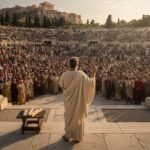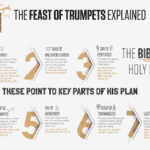Lent: Scripture, Tradition, and the Question of Origins truthsum.org
Discussions surrounding Lent often fall into two extremes. Many Christians assume that if a practice is ancient, widespread, and symbolically Christian, it must therefore be biblical. Others respond with sharp accusations, equating Lent with ancient pagan rituals and claiming participants are unknowingly “weeping for Tammuz.” Both approaches tend to shut down thoughtful examination rather than encourage it. A more careful approach distinguishes sincere modern devotion…
Three Choices: Good, Evil, & Life – Bill Hutchison leadingtolife.org
Stephen Covey observed that what distinguishes humans is our ability to step outside our emotions, thoughts, and instincts to evaluate and choose our response. This self-awareness allows us to act intentionally rather than reactively. Yet, despite this ability, many people allow feelings, conditioning, and impulse to define their actions, bypassing thoughtful reflection. Scripture highlights that a critical moment exists between experience and response – a space…
Is Lent in the Bible? – Isaac Khalil lifehopeandtruth.com
Lent is a 40-day period observed by some Christian denominations before Easter, involving fasting, prayer, and acts of repentance. While commonly associated with Catholicism, it is also practiced in various forms by Orthodox, Anglican, Lutheran, Methodist, and some Presbyterian churches. Despite its widespread observance, Lent is not mentioned anywhere in the Bible. Historically, early Christians did not observe a 40-day fast. Prior to the fourth…
From Transaction to Transformation: How Scripture Frames Law, Grace, Faith, and Salvation truthsum.org
Much of modern Christianity operates within a transactional framework—one that views salvation primarily as a legal exchange. Humanity stands guilty before God, Jesus pays the penalty, and believers are declared righteous in a courtroom sense. While this model contains biblical elements, it often reduces the gospel to legal status and escape from judgment. Scripture presents a deeper and more relational vision. The gospel is not…
Article 4 – Acts 15: The Council That Redefined the People of God truthsum.org
Acts 15 records a decisive moment in the early Church—not because doctrine changed, but because God’s actions forced clarity. The Jerusalem Council was not debating abstract theories of salvation. The question was far more concrete: Must Gentiles take on Jewish covenant identity in order to belong to the Spirit-filled people of God? Within first-century Judaism, belonging followed clear categories. Jews were born into the covenant….
The Wedge of Social Media: Formation, Humility, and the Test of Community truthsum.org
Social media offers unprecedented access to ideas and communities, but it also exposes the cracks in our formation. Every belief finds reinforcement, every doubt an echo, every opinion a following. Children grow up immersed in this environment, and adults are not immune. Families strain, and even churches feel the pull. What matters most is not how loudly something is said, but what kind of foundation…
Article 3: The Spirit as the Beginning of Salvation — Why Circumcision Was Never the Gateway truthsum.org
Before continuing, it’s worth explaining the deliberate pace of this series. Many assumptions modern Christians bring to Paul’s letters were not formed directly from Scripture, but from generations of layered explanations, inherited frameworks, and well-intentioned yet flawed teaching. Over time, these ideas shape how the text is read automatically, often without being questioned. What should be a fairly understandable subject has been made unnecessarily complex….
Boys to Men: The Father-Son Crisis – Joseph B. Baity cgg.org
Young men and boys in America are facing a growing crisis that has unfolded quietly for decades. The erosion of the nuclear family, the marginalization of masculine roles, and the decline of respect for elders have left many boys without clear purpose or strong male role models. Nowhere is this more evident than in the absence of fathers. According to the U.S. Census Bureau, nearly…
Did Paul Teach Righteousness Without Law-Keeping? cbcg.org
Many believe Paul taught that Christians are made righteous apart from any obedience to God’s law—especially when reading Romans 3:20–21: “By the deeds of the law no flesh shall be justified… But now the righteousness of God without the law is manifested.” On the surface, it sounds as if Paul dismissed law-keeping altogether. But is that what he meant? A closer look at the Greek…
The Feast of Trumpets: A Warning and a Hope youtu.be
The Feast of Trumpets is the fourth step in God’s plan of salvation, commanded in Leviticus 23:24 as a “memorial of blowing of trumpets.” In Scripture, trumpets announced war and destruction (Numbers 10) and the coronation of a king (1 Kings 1:34). Both meanings reveal the prophetic purpose of this day. First, it points to the coming Day of the Lord – a year-long period…
The Ideal Man – Donald Winchester vision.org
Many today are legitimately anxious about the future. Young men in particular see their chances for success, power and influence slipping away.
Five Myths About Grace – Kendrick Diaz lifehopeandtruth.com
Grace is one of the most recognized concepts in the Bible, but it’s also one of the most misunderstood.
Will the Dead Live Again? – Richard F. Ames thebiblesaysthat.com
Are you worried about loved ones who died without knowing Christ? Are they lost forever in torment? The truth is far more hopeful—and far less understood – than most imagine. Many believe in an ever-burning hell because of tradition, not Scripture. Dante’s Inferno, not the Bible, shaped much of today’s imagery of hell. But your Bible says, “The wages of sin is death” (Romans 6:23)…
Acts 20:7 — Was the Early Church Meeting on Sunday? truthsum.org
Many Christians point to Acts 20:7 as evidence that the early church held Sunday worship services. But a closer look at the passage — and how the first century understood time — tells a different story. In Scripture, a new day begins at sunset, not midnight. This means the “first day of the week” began on Saturday evening using modern vernacular, right after the Sabbath…
Pentecost and the Promise of the Father – John LaBissoniere ucg.org
Imagine if Jesus lived next door – healing, comforting, and guiding us instantly. Though He ascended to the Father long ago (John 16:28), He promised something even greater: the arrival of the Holy Spirit. At first, this seemed sorrowful to the disciples (John 16:6), but Jesus assured them it was for their benefit: “If I do not go away, the Helper will not come” (John…
Did Jesus Abolish the Seventh-day Sabbath? cbcg.org
In the Sermon on the Mount, Jesus affirmed that God’s commandments remain in force under the New Covenant “Therefore, whoever shall break one of these least commandments, and shall teach men so, shall be called least in the kingdom of [from] heaven; but whoever shall practice and teach them, this one shall be called great in the kingdom of heaven”(Matt. 5:19). Yet today, the Fourth…
Will Deceive Many (Part One) – Pat Higgins cgg.org
In Matthew 16:3, Jesus rebukes the Pharisees for recognizing weather signs but ignoring the “signs of the times.” Could we be making the same mistake? Our world is in rapid moral decline – corruption touches every institution. Jesus warned of days like these, comparing them to Noah’s time, when “all flesh had corrupted their way” (Genesis 6:12). As in Noah’s day, deception now defines our…
The Apostle Paul’s Teaching on Justification in the Book of Galatians cbcg.org
Many use Galatians 5:18 – “But if ye be led of the Spirit, ye are not under the law” – to argue that Christians are no longer required to keep God’s commandments. But this interpretation is based on poor translation and misunderstanding. The original Greek lacks the definite article “the,” meaning it should read, “not under law.” But what kind of law is Paul referring…























